This week we’re going to explore the amazing work of scholar Mendel Nun, who emigrated from Latvia to Israel in 1939 and spent twenty years fishing on the Sea of Galilee as a kibbutz member. As this was before the advent of modern “invisible” nets, he developed first-hand expertise in ancient fishing methods. I am really excited about this episode and about introducing you to the unique work of this brilliant scholar. His insights into the fishing narratives in the Gospels are just so eye-opening. This is a picture of him with nets like the ones that Simon, Andrew, James, and John were using, and would have to be stripped down naked in order to use–in the middle of the night, no less.
Here is a pic of him in his youth–you can see that these fishermen were not wimps! It was hard, back-breaking, dangerous work. Not for the timid.

Transcript below, loosely edited, as usual, due to abject laziness.
*********************
Mark 5—Fishers of Men
This is part five of my new series on the Gospel of Mark and I will probably do a replay of it when we do Luke 5 sometime in 2021 maybe. In part one, we talked about the message of the Gospel and the Greater Exodus (a subject which is often mishandled), then we covered the Forerunner, John the Baptist, and we used a lot of materials from Exodus, Isaiah, and the Psalms. Last week, we covered Yeshua’s (Jesus’s) baptism and temptation in the wilderness, which is presented much differently in Mark than in Matthew and Luke. Not surprising because all three of the synoptic Gospels are telling very different stories about the Messiah—all of them true but there are so many facets to who He is and how He fulfills Scripture that I wonder if three is nearly enough. John sure didn’t think so—he said that all the books in the world could not hold His deeds and his Gospel is WAY different than the Synoptics. Remember, Mark is what we would call an ancient biography and so it reads differently than most of the materials we find in the Hebrew Scriptures. It will focus on why this man is great and worthy of our admiration, adoration, and even worship. Why he is greater than any other man who has or will ever be and proving his pedigree and authority as the heir of David and God’s unique Son. Next week is where we are really going to start seeing this start to come together.
This week, we will be starting out in chapter one, verse sixteen, and going all the way to verse 20. I know, I know, that’s a lot of material. But seriously, we will be discussing a lot of the references to fishing through the eyes of an amazing scholar names Mendel Nun, may his memory be blessed AND we will be talking about a lot of different fishing references in all the different Gospels to find out what we can glean from them just by consulting an expert Galilean fisherman! Next week we will briefly look over this material again as we go forward but this is going to be a unique week where we talk about the topic behind the story—one that will allow us to have a greater understanding of the lives of Peter, Andrew, John and James.
Hi, I am Tyler Dawn Rosenquist and welcome to Character in Context, where I teach the historical and ancient sociological context of Scripture with an eye to developing the character of the Messiah. If you prefer written material, I have five years’ worth of blog at theancientbridge.com as well as my six books available on amazon—including a four-volume curriculum series dedicated to teaching Scriptural context in a way that even kids can understand it, called Context for Kids—and I have two video channels on YouTube with free Bible teachings for both adults and kids. You can find the link for those on my website. Past broadcasts of this program can be found at characterincontext.podbean.com and transcripts can be had for most broadcasts at theancientbridge.com
All Scripture this week comes courtesy of the ESV, the English Standard Version.
16 Passing alongside the Sea of Galilee, he saw Simon and Andrew the brother of Simon casting a net into the sea, for they were fishermen. 17 And Jesus said to them, “Follow me, and I will make you become fishers of men.” 18 And immediately they left their nets and followed him. 19 And going on a little farther, he saw James the son of Zebedee and John his brother, who were in their boat mending the nets. 20 And immediately he called them, and they left their father Zebedee in the boat with the hired servants and followed him.
And we tend to read right over this in order to get to the juicy drama at the synagogue in the next verse, but there is so much beautiful stuff right here to dwell on for a while. So often, we really don’t think about the real lives behind the description—but we know so much about Jewish life in Judea and Galilee during this time. First of all, this action took place in the very early morning hours. Fishermen around the sea of Galilee were active at night and in the early morning. For one thing, it made it easier to have a job that required a certain level of nakedness to be out and about when all respectable women were indoors. Yeah, you heard me. They don’t show THAT in the movies.
In fact, there’s a lot about this that we don’t pick up—like how we can know what time of year this happened and what kind of fish they were going after and, disastrously, we tie this to Jeremiah 16 for some very creative misinterpretations of the material. I have spent the last few days studying some of the exceptional work of a scholar named Mendel Nun—I will read from his bio on the Jerusalem Perspective, which I used to have a membership to and learned one heckuva lot: Galilean fisherman, kibbutz member, author and foremost expert on the Sea of Galilee, Mendel Nun was born into a Zionist family in Latvia in 1918. In 1939 he immigrated to Palestine where he became a member of Ein Gev, which today is a thriving, modern kibbutz on the lake’s eastern shore. For the next twenty years, Nun worked as a fisherman on the lake. It was during this period that he became interested in ancient fishing methods. In 1964 his book, Ancient Jewish Fishing (Hebrew), was published. For it, he was awarded the prestigious Ben-Zvi Prize. Nun’s Hebrew monograph on the Sea of Galilee appeared in 1977.
So, talk about an expert! He was working as a fisherman on the Sea of Galilee back before the advent of the modern transparent nets that allowed them to begin fishing during the day. He lived the life of the four fishermen called in today’s passage—albeit with electricity and modern plumbing, but the fishing business was brutal and difficult and unpleasant and not for weaklings. Today I want to give you some insight into these first four men called by Yeshua/Jesus and what we miss when we make assumptions and read things into the text (a practice which is called eisegesis, as opposed to exegesis, when you read the text to find out what is and is not actually there).
We’re also going to look at the “call” stories of these four in the other Gospels to see the bigger picture that Mark wasn’t really interested in. Remember, the focus of Mark was to paint Yeshua as God’s chosen avenue for the Greater Exodus spoken of by Isaiah the prophet, which is why we spent seventeen weeks on that. In doing so, Mark will paint Yeshua as the focal point for the breaking in or invasion of God’s Kingdom into the realm of Satan’s Kingdom. But this week we won’t talk about any of that. This week we are going to delve into the topic of fishing so that all the fishing passages will be a lot more meaningful and you will be able to see the hidden context. I am not going to reference specific articles by Mendel Nun, but I will have a reading list of them posted to the transcript when this goes up on my blog on Friday. They are all found at the Jerusalem Perspective website but Nun also wrote a book which I do not yet have called The Sea of Galilee and it’s Fisherman in the New Testament and it probably covers the same exact materials or at least close enough.
Matthew 4:18 “While walking by the Sea of Galilee, he saw two brothers, Simon (who is called Peter) and Andrew his brother, casting a net into the sea, for they were fishermen. 19 And he said to them, “Follow me, and I will make you fishers of men.” 20 Immediately they left their nets and followed him. 21 And going on from there he saw two other brothers, James the son of Zebedee and John his brother, in the boat with Zebedee their father, mending their nets, and he called them. 22 Immediately they left the boat and their father and followed him.”
So, the Matthew account looks almost word for word the same as Mark, but we will save Luke for later.
Now for us modern “uneducated in the realities of fishing life in the first-century” duffers, all of these accounts really don’t appear to be the treasure trove of context that they are, so that’s why we need to listen to Mendel Nun and not to people who make movies and write fiction and generally take what they believe to be true, as true, based on how fishing is done in modern times.
First of all, we need to know that fishing was done at night. There is a very simple reason for this—nets were made of cotton or linen lines and they were very easily seen during the day by fish. A net put into the water during the day wouldn’t yield anything except blind fish as visible nets are easily avoided. It actually wasn’t until the mid-twentieth century that nylon nets were invented, invisible to fish, and allowed fishermen to go out during the day. So, in Mark and Matthew, we see Simon and Andrew still casting a net into the sea, which means that it was still dark out. James and John and their father and the hired men were on their boat mending their nets—this was performed in the mornings when the nets had to be rinsed, repaired, and hung out to dry. An unrinsed cotton or linen fiber net left in the boat all day would rot. And they couldn’t buy a new one cheap. Caring for your nets properly was your life.
And so, when we see Simon and Andrew immediately leaving their nets, you can only imagine the shock value. “They did what???” The text says that the three of them moved on and later found John, James, their father and the hired men mending nets, so it is light out now. They got called and they left—not nearly so shocking from the vantage point of leaving their nets behind (because there were still at least three men there) but it would seem that this family was better off than Simon and Andrew’s which mentions no hired men (however, they most likely had partners—and actually Luke says that they did) and so they are leaving a much better situation.
Now, before we get to the other accounts, let’s talk about the backbreaking work of ancient fishing. First, let’s talk about the three main good kinds of fish in the Sea of Galilee and the one which would be called bad. The bad fish would be referring to catfish—which surprised me because I thought they were native to the US. Not so. If you have never seen one, that is a face that only a mother could even begin to tolerate. The three main good fish are sardines, which is what is being referred to when we hear things like “seven loaves and two small fish” in the feeding of the four thousand in Matthew 15 and again in Mark 8. And by small, it really means small. Buy sardines some time and just stand amazed at how many sardines it would have taken to feed that crowd!
As far as good fish goes, we have carp and tilapia. Yes, that might be a big shock if you have seen that silly meme on Facebook saying that tilapia is a man-made fish that doesn’t exist in the wild but if you look closely at the fish in that meme. The meme says that it doesn’t have fins, scales, or bones and the fish in the picture clearly has all three. Tilapia are native to Egypt and the Near East and actually, the hieroglyph for fish is clearly a tilapia. So, Yeshua definitely ate tilapia when He got a chance, and carp and sardines—which were pickled, aka salted. Sardines were not eaten fresh, but carp and tilapia were and they were in high demand.
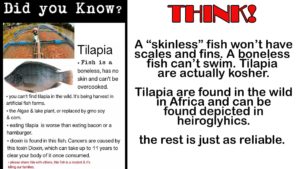 (This is an anti-meme I made a few years ago back when this tilapia propaganda was circulating widely)
(This is an anti-meme I made a few years ago back when this tilapia propaganda was circulating widely)
I am not going to talk about the two different kinds of nets in great detail because you really need to see pictures to understand how it works, but there were two main kinds—trammel nets and cast nets. A Trammel net is what we see being used in John 21 and it would be used with multiple boats. One net is rather like a huge barrel and many four-man fishing boats could actually be operating inside one, it is so big. The fish are trapped within it—almost—fish that don’t get caught up in the layers of this three-layer net might try to jump out. 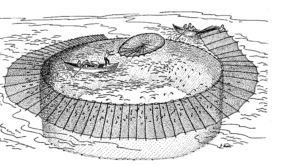 Fish aren’t stupid, as any good fisherman will tell you. It’s a battle of wits. So there is a secondary net that lays out flat on the surface and the fish that try to jump out get caught up in it. Now, what about the fish that stay safe in the middle without getting caught? Those fish get caught by circular weighted cast nets. The fisherman would throw the net into the water and then dive in after it and bring it back up—hopefully with fish in it. Which is why they were stripped naked. Don’t imagine they were jumping in with their robes on, or any clothing because (1) you would drown in robes and (2) you could lose your loincloth and why wear it when there are just a bunch of guys on the boat and no one else around? If you want to see period art depicting these naked fishermen, check out Mendel Nun’s awesome article, “What Was Simon Peter Wearing When He Plunged into the Sea?” and that can be found on the Jerusalem Perspective website.
Fish aren’t stupid, as any good fisherman will tell you. It’s a battle of wits. So there is a secondary net that lays out flat on the surface and the fish that try to jump out get caught up in it. Now, what about the fish that stay safe in the middle without getting caught? Those fish get caught by circular weighted cast nets. The fisherman would throw the net into the water and then dive in after it and bring it back up—hopefully with fish in it. Which is why they were stripped naked. Don’t imagine they were jumping in with their robes on, or any clothing because (1) you would drown in robes and (2) you could lose your loincloth and why wear it when there are just a bunch of guys on the boat and no one else around? If you want to see period art depicting these naked fishermen, check out Mendel Nun’s awesome article, “What Was Simon Peter Wearing When He Plunged into the Sea?” and that can be found on the Jerusalem Perspective website.
Now, this whole operation with the three nets, and of course the cast net would be used quite a few times to pick up the untrapped fish, it would happen from anywhere between ten and fifteen times a night. Great googly moogly, that is some seriously hard work. Laying out the nets took some serious rowing skill in the first place, laying out and especially hauling back in the nets was work for strong men. And think about being naked out there—the best time of year for fishing was in the winter, during the time of the early rains—which are not gentle showers, lemme tell you. And that’s another reason to be naked. Sure, it’s cold and in the middle of the night but a fisherman laden down by wet clothing is going to be in significant danger of his very life. The clothing would get heavier and heavier and if he went overboard, he might not come back up. Simon, Andrew, James, and John were not soft or wimpy men. They were calloused, well-muscled men with thick skin who had endured a lot of what we would call suffering in order to make a living.
Okay, so what can we tell about the time of year it was when Yeshua began His ministry and gathered up His disciples? Well, Nun argues that because of the mention of nets (plural) that they were using the trammel nets and not the other sort of net mentioned in Scripture, namely the metsudah, translated into English as snare. They were using a multi net system, which strongly suggests that they were fishing in the north near Capernaum for musht (large fish)—which would have made it wintertime. These fish, the biggest of which is a tilapia, would be eaten fresh and the tilapia are the only large fish in the Sea of Galilee that move in schools—which is the only reason that trammel fishing works for catching them. You can catch other big fish in the trammel net by chance, but trammel net fishing with he multiple nets is done for the purpose of catching an entire school. I agree with the idea that it would be winter for other reasons as I firmly believe that the Temptation in the Wilderness took place during the prophetically important season of Teshuva from Elul 1 to Yom Kippur. I actually did a broadcast about that last year (2019) laying that theory out which you can find at characterincontext.podbean.com or on my website theancientbridge.com.
But even if they were fishing for sardines, this would still be winter because the fishing season for “small fish” was November through February. They would be sold to the picklers in Magdala, which was famous for sardines and is also the residence of Mary of Magdala, mentioned as a follower of Yeshua. Speaking of Magdala, in 1986 some Kibbutz members happened across a very well preserved fishing boat that carbon-dated to the first century. The boat was 29’ x 8’ x 4’—this is a rather big boat. Unless of course it is packed with four men and a ton of nets and fish!!
Now, when Yeshua passed by Simon and Andrew, they were casting a net, singular. This means that they were probably standing in shallow water and throwing and retrieving a cast net and then pulling it up together. If they were out in the water in a boat, Yeshua would probably not be issuing such a call and since it doesn’t say they had to swim or row to shore, there’s that. Perhaps they were done in the water for the night (we know they had a boat of their own from the Luke account) and they were seeing if they could have a bit more luck. The account in Luke suggests that they had had a bad night of it—if the accounts are describing the same encounter.
John, James, Zebedee, and the hired men, on the other hand, had plural nets so when Yeshua came across them, they were mending them at the end of a long night’s work. Luke has a very different encounter explained—might be the same or might be a different day. The text is not specific.
5 On one occasion, while the crowd was pressing in on him to hear the word of God, he was standing by the lake of Gennesaret, 2 and he saw two boats by the lake, but the fishermen had gone out of them and were washing their nets. 3 Getting into one of the boats, which was Simon’s, he asked him to put out a little from the land. And he sat down and taught the people from the boat. 4 And when he had finished speaking, he said to Simon, “Put out into the deep and let down your nets for a catch.” 5 And Simon answered, “Master, we toiled all night and took nothing! But at your word I will let down the nets.” 6 And when they had done this, they enclosed a large number of fish, and their nets were breaking. 7 They signaled to their partners in the other boat to come and help them. And they came and filled both the boats, so that they began to sink. 8 But when Simon Peter saw it, he fell down at Jesus’ knees, saying, “Depart from me, for I am a sinful man, O Lord.” 9 For he and all who were with him were astonished at the catch of fish that they had taken, 10 and so also were James and John, sons of Zebedee, who were partners with Simon. And Jesus said to Simon, “Do not be afraid; from now on you will be catching men.” 11 And when they had brought their boats to land, they left everything and followed him.
Wow, compared to the bare-bones accounts given by Mark and Matthew, this is pretty darned exciting.
Let’s look at what time of day this was—you probably already noticed that it was morning for a number of reasons (1) they were washing their nets, which along with drying them was important for keeping them from rotting, (2) Simon says they had already worked all night and gotten nothing for their efforts. Can you imagine how exhausted Simon (Peter) was? A whole night’s work, naked, in the cold wet unpleasantness of winter—rowing and laying out nets and casting nets and diving down after them only to come up empty again and again. Wouldn’t you be frustrated? And nights like these were not uncommon. And this non-fisherman comes up, bold as you please, because He has been teaching a crowd that got too big and was pressing in, and he wants you to maybe spend an hour or more keeping the boat steady while He preaches. Seriously? I mean, yeah, John said this guy was the Coming One, but geez Louise you are about to drop. But, you do it for the guy and then he says something just crazy. “Oh hey, the nets you have already rinsed out—you and your buddies need to go back out on the water and try again.” This is no small request. The nets will have to be rinsed again, repaired again. This is like a nightmare. All these guys want is to go home and eat and sleep until it’s time to go back out again. Hence. Simon’s response, which I think might have been a bit more snippy than the text suggests.
“Master, we worked all night long. (You obviously don’t know squat about fishing) But, if you say so, sure! Whatever you say, boss!”
Then what is described is obviously a trammel net operation. And when they had done this, they enclosed a large number of fish, and their nets were breaking. So, the fish were surrounded by the nets and caught up in them—in the daylight. Both boats were filled to the point of beginning to sink. And Yeshua was still there in the boat, with all these naked guys, and Peter fell down at Yeshua’s knees (the text had previously said he was sitting as He taught so maybe He was still sitting although I have no idea where since the boat was full of guys, fish, and nets) naked as a jaybird and repents for being snitty. He admits his sin. And I love the take of David Bivin on this episode in his article, “The Miraculous Catch.”
“But there is more to these Galilean fishermen’s reaction of amazement than the catch itself or its size. Until the introduction of transparent nylon nets in the mid-1950s, trammel-net fishing was done only at night. In the daytime, the fish could see the nets and avoid them. The miracle was not so much that there were now large numbers of fish in an area of the lake where only a few hours before there had been none, but that the fish swam blindly into the net. In addition, in trammel-net fishing the fish had to be scared into the nets after the nets had been put in place. Although possible, it does not seem from Luke’s account that the fishermen made a commotion to frighten the fish.
What was it, then, that caused Peter to fall in fear at Jesus’ feet? Apparently, it was a combination of things, but probably most of all it was the timing of the miracle. It was amazement at Jesus’ ability to, as we say, “call the shots.” Immediately after he finished preaching, when it was convenient for him, Jesus compensated these fishermen for their inconvenience.
This confidence of Jesus stands out. To teach a crowd of people Jesus apparently did not mind the inconvenience he caused these fishermen because he planned to reward them for their service and knew that he could do so whenever he wished. We see this same confidence demonstrated by Peter after Pentecost when Peter, knowing in advance what he was going to do and what would be the result, healed a lifelong cripple (Acts 3:6).
Jesus was not unaware of the tiredness of the fishermen and their frustration at not having caught anything after working so hard all night. He knew that they were dead tired and wanted to go home and get some sleep. He also knew of their general need for income and their particular lack of it after this unsuccessful night of fishing. He removed their frustration at having wasted a night’s work and blessed them with enough fish to compensate them not just for the few hours he took of their time, but with as many fish as they would normally have caught in several nights of good fishing. Mendel Nun estimates the catch described in Luke 5 at about three-fourths of a ton, as much as a trammel-net fishing crew would normally take in two week’s work, allowing for nights like the one that Peter and his crew had just experienced when nothing is caught.”
I love that. Bivin is a really great researcher, also with the Jerusalem Perspective.
We have one more fishing episode–John skips the early ministry accounts entirely and focuses all his fishing interest on an appearance after the resurrection. Let’s see how far we get before I hit the end of the broadcast.
John 21 After this Jesus revealed himself again to the disciples by the Sea of Tiberias, and he revealed himself in this way. 2 Simon Peter, Thomas (called the Twin), Nathanael of Cana in Galilee, the sons of Zebedee, and two others of his disciples were together. 3 Simon Peter said to them, “I am going fishing.” They said to him, “We will go with you.” They went out and got into the boat, but that night they caught nothing.
4 Just as day was breaking, Jesus stood on the shore; yet the disciples did not know that it was Jesus. 5 Jesus said to them, “Children, do you have any fish?” They answered him, “No.” 6 He said to them, “Cast the net on the right side of the boat, and you will find some.” So they cast it, and now they were not able to haul it in, because of the quantity of fish. 7 That disciple whom Jesus loved therefore said to Peter, “It is the Lord!” When Simon Peter heard that it was the Lord, he put on his outer garment, for he was stripped for work, and threw himself into the sea. 8 The other disciples came in the boat, dragging the net full of fish, for they were not far from the land, but about a hundred yards off.
9 When they got out on land, they saw a charcoal fire in place, with fish laid out on it, and bread. 10 Jesus said to them, “Bring some of the fish that you have just caught.” 11 So Simon Peter went aboard and hauled the net ashore, full of large fish, 153 of them. And although there were so many, the net was not torn. 12 Jesus said to them, “Come and have breakfast.” Now none of the disciples dared ask him, “Who are you?” They knew it was the Lord. 13 Jesus came and took the bread and gave it to them, and so with the fish. 14 This was now the third time that Jesus was revealed to the disciples after he was raised from the dead.
Now, seven people in a boat is a lot—but remember that John is very midrashic and often does not agree with the other Gospels. Having seven disciples in the boat was playing on the importance of numbers—just as the number 153 is also significant numerically. But if you want a full explanation on that you will have to go to my friend Dinah Dye. She has an article called, “Israel as Fish” on her website foundationsintorah.com and it is available at the free pashat level of access. I do not teach that stuff, but she is the best at it—very responsible, doesn’t come up with some of the silly stuff I see from people out there. So anyway, seven men in the boat, they cast the net on the right side, singular net—maybe a metsudah, or snare net, because they dragged it back—unable to pull it into the boat. A cast net is also a possibility. I mean, if a boat could hold the contents of the trammel nets, I am not sure even a super full snare net was going to threaten the boat. But then, I really don’t know. Guessing here.
As soon as Peter sees the great catch, of course, His mind goes back to the miraculous catch in Luke at the beginning of their common journey with Yeshua and he “put on his outer garment” and threw himself into the sea and swam to shore, with his buddies potentially cursing under their breath because Peter was always pulling something boneheaded. Now, the Greek word is ependytes and that means outer cloak—but given all the archeological and other evidence, it is almost certainly just a loincloth. What kind of an idiot fisherman would put on a voluminous outer garment and then jump into the sea? One that wanted to drown, that’s what kind. Imagine being in the water in such a heavy, coarse, wet garment. Ask Jonah what it was like.
It’s absolutely amazing—the context of little seemingly insignificant things that can open up a wealth of knowledge as to the time of day, what time of year it is, and all of that. It is easy to read over it but that is why real experts are so important and what a blessing it is to have a Bible scholar who also just happened to be a fisherman from a kibbutz on the Sea of Galilee back when they were still fishing using these ancient techniques! I hope you will look up his articles and maybe his book. Good stuff.

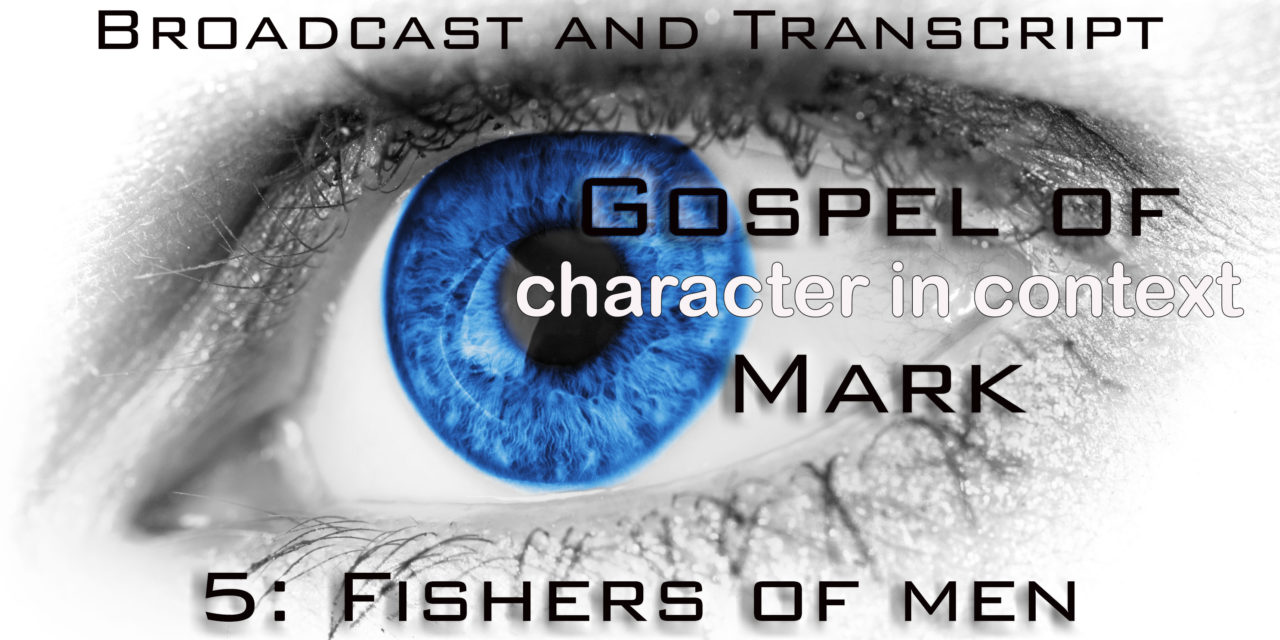


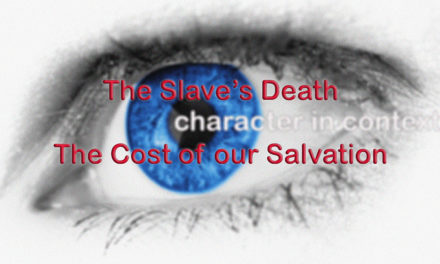


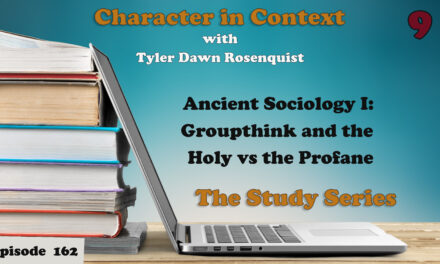














Tyler, you keep me young! 😄 learning things about the book that I never imagined.
I know that there’s more where that came from. 😇
It’s only fair since you keep me supplied with books lol